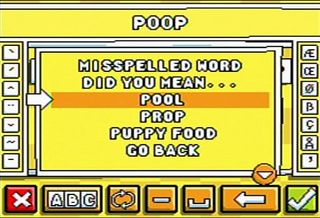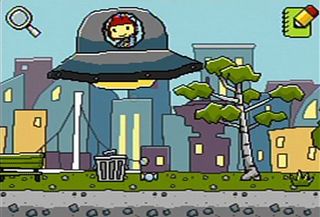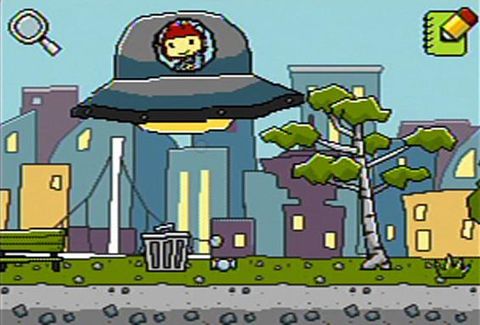GamesRadar+ Verdict
Pros
- +
Ambitious concept
- +
Experimenting with objects on the title screen
- +
Sharing levels online
Cons
- -
Frustrating controls
- -
Too many samey puzzles
- -
Being at a loss for words
Why you can trust GamesRadar+
If you’re like us, you had high hopes for Scribblenauts. This little DS game represents somethingrevolutionarynot just for the DS’s library, but also (we’re being serious) for videogames as a whole. Forgive us if we sound hyperbolic here, but Scribblenauts is one of the most important games to come out this year.
…Which makes it all the more disappointing that it doesn't quite live up to its potential.
The central gameplay mechanic behind Scribblenauts is what got us so excited in the first place. The game enables you to type anything (and the developers emphasize “anything”) into the game’s keypad, and poof! It will immediately appear as an object for Maxwell, the game’s protagonist, to interact with. Want a teapot? It’s there. Want a cheesecake? You got it. Machine gun? Sure. We guarantee your first ten minutes with the game will be spent at the title screen, simply typing random things in just to see what pops up. (And no, you can’t type in dirty words, non-objects or copyrighted images. We tried.)

Above: Come on – even our grandma says “poop”
In each level, Maxwell is presented with a simple task that will lead him to a Starite, which he needs to grab to complete the level. Sometimes the Starite will be hidden, and you’ll need to do something to make it appear, but the solution will always involve summoning some object into existence to help you complete your task. Since you have tens of thousands of objects at your disposal, there are tons of unique ways to complete each puzzle, and due to the sheer number of inter-object relationships to exploit (zombies like eating brains, but tend to avoid open flames), you can solve each of the game’s puzzles in a way that ends up feeling refreshingly unscripted.

Above: picking up trash is so much better in a UFO
Scribblenauts is said to be special in that it encourages “emergent gameplay;” in fact, if you look up “emergent gameplay” onWikipedia, you’ll see Scribblenauts mentioned right there in the description. You sometimes see examples of emergent gameplay in open-world games: by programming a wide variety of things to interact with, the developers hope players will craft their own experience with the tools they have. For instance, a number of Grand Theft Auto IV’s users have abandoned the game’s main quest (preset missions in which you commit crimes for money and power) in favor of makingkickass stunt videos, or, in our case,pushing people down steps.
Without getting too off-topic, this creative flexibility is what makes Scribblenauts (and to a certain degree, videogames as a whole) special. Scribblenauts feeds off your creativity – if you decide to light a cat on fire in order to light a dark room, you’ve solved the puzzle your way. Yes, you’re working with pre-rendered assets and animations created by the developers so technically, the gameplay isn’t truly open-ended, but it’s pretty darn close, and it’s pretty darn cool.
But by now, you’re probably wondering about that “doesn't quite live up to its potential” comment. Well, about that…
More info
| Genre | Puzzle |
| Description | While there are a few puzzles with satisfyingly original solutions, the freedom to write anything you want is outweighed by the limitations of the core mechanic and the lousy controls. |
| Platform | "DS" |
| US censor rating | "Everyone 10+" |
| UK censor rating | "" |
| Release date | 1 January 1970 (US), 1 January 1970 (UK) |

The Stellar Blade dev team had a "competition" to see who could beat a boss first: "From that moment, all of us understood how to design the combat"

Russell Crowe is a pretend priest plagued by very real demons in the creepy first trailer for new horror movie The Exorcism

35 years after his introduction, The Simpsons just killed off a character who's been there since episode 1
